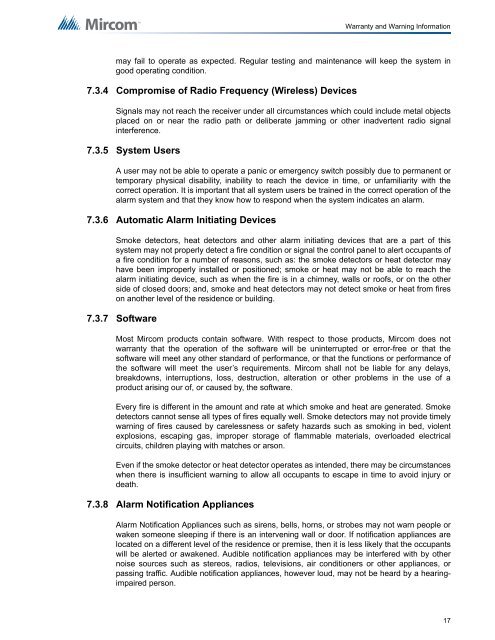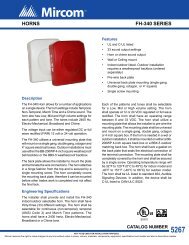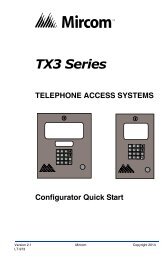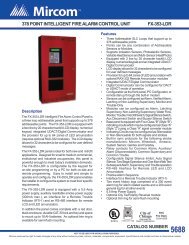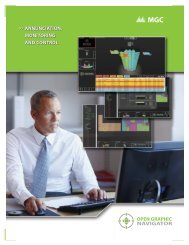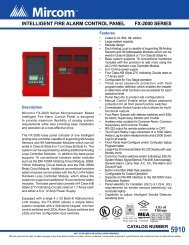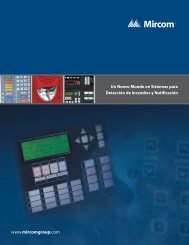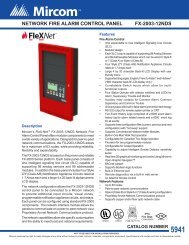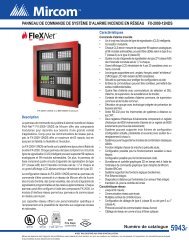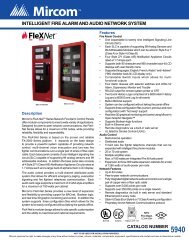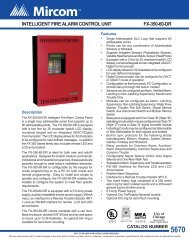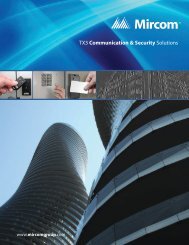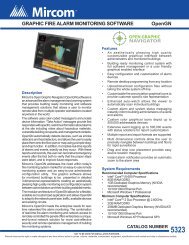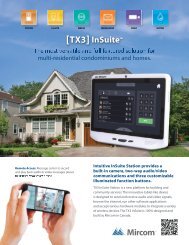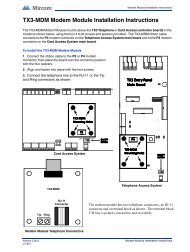LT-1002_RAM-300LCD_Installation_and_Operation_Manual - Mircom
LT-1002_RAM-300LCD_Installation_and_Operation_Manual - Mircom
LT-1002_RAM-300LCD_Installation_and_Operation_Manual - Mircom
Create successful ePaper yourself
Turn your PDF publications into a flip-book with our unique Google optimized e-Paper software.
Warranty <strong>and</strong> Warning Information<br />
may fail to operate as expected. Regular testing <strong>and</strong> maintenance will keep the system in<br />
good operating condition.<br />
7.3.4 Compromise of Radio Frequency (Wireless) Devices<br />
Signals may not reach the receiver under all circumstances which could include metal objects<br />
placed on or near the radio path or deliberate jamming or other inadvertent radio signal<br />
interference.<br />
7.3.5 System Users<br />
A user may not be able to operate a panic or emergency switch possibly due to permanent or<br />
temporary physical disability, inability to reach the device in time, or unfamiliarity with the<br />
correct operation. It is important that all system users be trained in the correct operation of the<br />
alarm system <strong>and</strong> that they know how to respond when the system indicates an alarm.<br />
7.3.6 Automatic Alarm Initiating Devices<br />
Smoke detectors, heat detectors <strong>and</strong> other alarm initiating devices that are a part of this<br />
system may not properly detect a fire condition or signal the control panel to alert occupants of<br />
a fire condition for a number of reasons, such as: the smoke detectors or heat detector may<br />
have been improperly installed or positioned; smoke or heat may not be able to reach the<br />
alarm initiating device, such as when the fire is in a chimney, walls or roofs, or on the other<br />
side of closed doors; <strong>and</strong>, smoke <strong>and</strong> heat detectors may not detect smoke or heat from fires<br />
on another level of the residence or building.<br />
7.3.7 Software<br />
Most <strong>Mircom</strong> products contain software. With respect to those products, <strong>Mircom</strong> does not<br />
warranty that the operation of the software will be uninterrupted or error-free or that the<br />
software will meet any other st<strong>and</strong>ard of performance, or that the functions or performance of<br />
the software will meet the user’s requirements. <strong>Mircom</strong> shall not be liable for any delays,<br />
breakdowns, interruptions, loss, destruction, alteration or other problems in the use of a<br />
product arising our of, or caused by, the software.<br />
Every fire is different in the amount <strong>and</strong> rate at which smoke <strong>and</strong> heat are generated. Smoke<br />
detectors cannot sense all types of fires equally well. Smoke detectors may not provide timely<br />
warning of fires caused by carelessness or safety hazards such as smoking in bed, violent<br />
explosions, escaping gas, improper storage of flammable materials, overloaded electrical<br />
circuits, children playing with matches or arson.<br />
Even if the smoke detector or heat detector operates as intended, there may be circumstances<br />
when there is insufficient warning to allow all occupants to escape in time to avoid injury or<br />
death.<br />
7.3.8 Alarm Notification Appliances<br />
Alarm Notification Appliances such as sirens, bells, horns, or strobes may not warn people or<br />
waken someone sleeping if there is an intervening wall or door. If notification appliances are<br />
located on a different level of the residence or premise, then it is less likely that the occupants<br />
will be alerted or awakened. Audible notification appliances may be interfered with by other<br />
noise sources such as stereos, radios, televisions, air conditioners or other appliances, or<br />
passing traffic. Audible notification appliances, however loud, may not be heard by a hearingimpaired<br />
person.<br />
17


